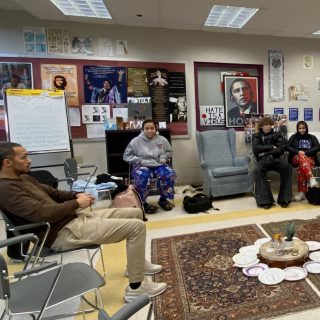Amherst’s first-ever AAPI Heritage Month event a success, in part due to AAPI activists at ARHS

On May 7, at 1 p.m., about 50 people gathered on the Amherst Town Common for an event that had never occurred before in the town’s history, the Asian-American and Pacific Islander Heritage Month Celebration.
For about two hours, attendees were able to enjoy performances, art, and food while celebrating AAPI heritage. The event was organized by many different people and organizations, including the Amherst Human Rights Commission and students at ARHS.
The AAPI heritage month celebration provided attendees with a variety of activities, including different tables where people could make traditional crafts, such as Indonesian character stamping and paper-cutting of Chinese characters. There were many different performances, including Chinese ballet, a Hawaiian dance, and a performance from the Chicopee Kung Fu school. Attendees were also able to place a pin on a map to show where they or their ancestors were from.
Admission to the event was free, and food was provided by local Asian restaurants including Fresh Side, Formosa, Oriental Flavors, and Miss Saigon. However, one of the most integral parts of the event was its speeches, including a proclamation by the town of Amherst about AAPI month.
ARHS senior Sea Kay Leung, a leader at the event, believes that the response to the celebration was very positive. She enjoyed the event a lot herself,
“It was a great thing to see for the Amherst town to come into solidarity, and not just the AAPI community,” Leung said.
Some leaders in the AAPI community attended, including Dr. Richard T. Chu, a member of the Asian American and Pacific Island Commission who is currently serving a three-year term. He is also a history professor at UMass Amherst and teaches at all five of the colleges in the area. During his career, Chu has looked to create an equitable society and works closely with organizations, groups, and people dedicated to doing so.
ARHS seniors Leung and Juliana Shepard and junior Talvin Dhingra worked to help develop the celebration. The three encouraged fellow classmates to attend or perform at the event. Members of the AAPI club at ARHS, which Leung founded, gave a speech about the celebration of AAPI people, specifically in the environment of a town like Amherst. They discussed how the AAPI community stands in solidarity with other groups of people and are very significant in society.
AAPI people are “woven into the American fabric, from business to medicine to politics,” Leung stated in her speech.
Shepard is also a member of the Amherst Human Rights Commission, which helped develop the plans for the AAPI heritage month celebration. “My role was to help organize a schedule, brainstorm ideas for the event, and to help reach out to performers,” she said.
Shepard said that to her knowledge the event was created last year, but this was the first in-person option. The event involved lots of coordination between local businesses, organizations, and leaders in the community.
The AAPI club was developed very recently, in part spurred on in reaction to hateful actions taken against the AAPI community during the pandemic. A previous article in The Graphic by Cynthia Xie on April 10, 2021, called “AAPI students condemn Asian hate and describe years of microaggressions,” talked about the lack of response to hate crimes and racism towards the AAPI community.
During the pandemic, ignorant and racist statements by former president Donald Trump, blaming Asian communities for the COVID-19 pandemic, influenced many people in America and led to an uptick in racist actions.
Despite this prominent increase, many microaggressions and acts of racism remained ignored, with people claiming they were not that significant, or that they were not actually fueled by racism. It was only after a mass shooting in Atlanta Georgia that killed eight people, including six women of Asian descent that “news coverage alerted the public to an alarming spike in anti-Asian violence as the COVID-19 pandemic swept the globe,” Xie wrote.
In response to society’s complacency towards racism against the AAPI community, ARHS students organized protests, spoke out, and developed the AAPI club.
The event’s location was especially important to its impact on the AAPI community. There are many AAPI events and policies in place in large urban areas such as Boston. However, rural towns and counties, including Amherst, often get overlooked.
The celebration was created to “show that AAPI people are not just in the metropolitan areas, like greater Boston,” Leung stated. Regions like greater Boston have a large population of AAPI people, and because smaller towns like Amherst have smaller populations comparatively, the policies in place for these communities are overshadowed. The event looked to acknowledge AAPI people in the town of Amherst and state that they “matter in policies,” Leung said.
The AAPI heritage month celebration provided a safe space for the town of Amherst to come together and acknowledge the AAPI community as well as support them. This event worked to strengthen the bonds between people and recognize the lives of AAPI people in the region. Many aspects of the event were significant and had a profound effect, but the most important factor was “everybody coming together, that everybody brought something to the table,” said Leung.














